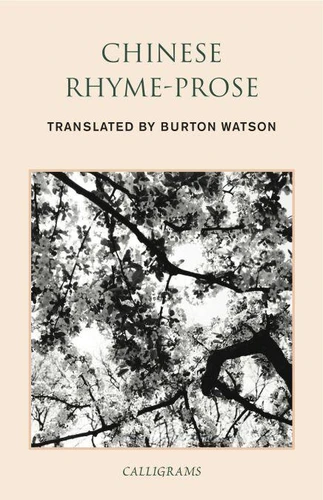Chinese Rhyme - Prose
Par : ,Formats :
Disponible dans votre compte client Decitre ou Furet du Nord dès validation de votre commande. Le format ePub protégé est :
- Compatible avec une lecture sur My Vivlio (smartphone, tablette, ordinateur)
- Compatible avec une lecture sur liseuses Vivlio
- Pour les liseuses autres que Vivlio, vous devez utiliser le logiciel Adobe Digital Edition. Non compatible avec la lecture sur les liseuses Kindle, Remarkable et Sony
- Non compatible avec un achat hors France métropolitaine
 , qui est-ce ?
, qui est-ce ?Notre partenaire de plateforme de lecture numérique où vous retrouverez l'ensemble de vos ebooks gratuitement
Pour en savoir plus sur nos ebooks, consultez notre aide en ligne ici
- Nombre de pages172
- FormatePub
- ISBN978-962-996-930-1
- EAN9789629969301
- Date de parution13/01/2015
- Protection num.Adobe DRM
- Taille2 Mo
- Infos supplémentairesepub
- ÉditeurNew York Review Books
Résumé
Selected as one of the sixty-five masterpieces for the UNESCO Collection of Representative WorksThe fu, or rhyme-prose, is a major poetic form in Chinese literature, most popular between the 2nd century b.c. and 6th century a.d. Unlike what is usually considered Chinese poetry, it is a hybrid of prose and rhymed verse, more expansive than the condensed lyrics, verging on what might be called Whitmanesque.
The thirteen long poems included here are descriptions of and meditations on such subjects as mountains and abandoned cities, the sea and the wind, owls and goddesses, partings and the idle life. Burton Watson is universally considered the foremost English-language translator of classical Chinese and Japanese literature for the past five decades. Gary Snyder calls him a "great and graceful scholar, " and Robert Aitken has written that "Burton Watson is a superb translator because he knows what literature is." Here his seemingly effortless translations are accompanied by a comprehensive introduction to the development and characteristics of the fu form, as well as excerpts from contemporary commentary on the genre.
A path-breaking study of pre-modern Chinese literature and an essential volume for poetry readers, the book has been out of print for decades. For this edition, Lucas Klein has provided a preface that considers both the fu form and Watson's extraordinary work as a whole.
The thirteen long poems included here are descriptions of and meditations on such subjects as mountains and abandoned cities, the sea and the wind, owls and goddesses, partings and the idle life. Burton Watson is universally considered the foremost English-language translator of classical Chinese and Japanese literature for the past five decades. Gary Snyder calls him a "great and graceful scholar, " and Robert Aitken has written that "Burton Watson is a superb translator because he knows what literature is." Here his seemingly effortless translations are accompanied by a comprehensive introduction to the development and characteristics of the fu form, as well as excerpts from contemporary commentary on the genre.
A path-breaking study of pre-modern Chinese literature and an essential volume for poetry readers, the book has been out of print for decades. For this edition, Lucas Klein has provided a preface that considers both the fu form and Watson's extraordinary work as a whole.
Selected as one of the sixty-five masterpieces for the UNESCO Collection of Representative WorksThe fu, or rhyme-prose, is a major poetic form in Chinese literature, most popular between the 2nd century b.c. and 6th century a.d. Unlike what is usually considered Chinese poetry, it is a hybrid of prose and rhymed verse, more expansive than the condensed lyrics, verging on what might be called Whitmanesque.
The thirteen long poems included here are descriptions of and meditations on such subjects as mountains and abandoned cities, the sea and the wind, owls and goddesses, partings and the idle life. Burton Watson is universally considered the foremost English-language translator of classical Chinese and Japanese literature for the past five decades. Gary Snyder calls him a "great and graceful scholar, " and Robert Aitken has written that "Burton Watson is a superb translator because he knows what literature is." Here his seemingly effortless translations are accompanied by a comprehensive introduction to the development and characteristics of the fu form, as well as excerpts from contemporary commentary on the genre.
A path-breaking study of pre-modern Chinese literature and an essential volume for poetry readers, the book has been out of print for decades. For this edition, Lucas Klein has provided a preface that considers both the fu form and Watson's extraordinary work as a whole.
The thirteen long poems included here are descriptions of and meditations on such subjects as mountains and abandoned cities, the sea and the wind, owls and goddesses, partings and the idle life. Burton Watson is universally considered the foremost English-language translator of classical Chinese and Japanese literature for the past five decades. Gary Snyder calls him a "great and graceful scholar, " and Robert Aitken has written that "Burton Watson is a superb translator because he knows what literature is." Here his seemingly effortless translations are accompanied by a comprehensive introduction to the development and characteristics of the fu form, as well as excerpts from contemporary commentary on the genre.
A path-breaking study of pre-modern Chinese literature and an essential volume for poetry readers, the book has been out of print for decades. For this edition, Lucas Klein has provided a preface that considers both the fu form and Watson's extraordinary work as a whole.



